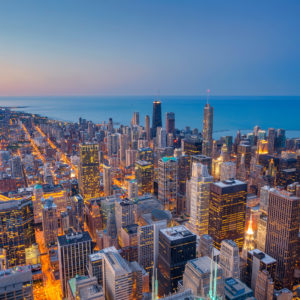Chicago has been in the news lately for all the wrong reasons.
Mayor Lori Lightfoot recently came under scrutiny for poor treatment of her staff. An email brought to light by The Chicago Tribune shows Lightfoot repeating herself like a petulant child. Her loss of temper is almost comedic. What’s more concerning and far more serious, however, is the sharp increase in violent crime Lightfoot’s city has seen this year.
Crime rates in America’s third-largest city have risen exponentially over the last year — a problem big cities across America are all facing. And while much attention has been given to the increase in violent crime rates in the U.S., another issue plaguing major metropolises has taken the backseat, as it always does: Property crime.
It’s not usually considered a pressing issue, but recent evidence shows that property crime can destroy lives, close businesses, and hurt marginalized communities. As mayors all across America prepare for a summer surge in crime, they should certainly focus on abating violence, but they should be careful not to neglect the criminal property damage that’s deeply affecting neighborhoods and communities.
Businesses are run by real people, and property damage like vandalism often hurts vulnerable small business owners the most. After a black-owned business in Chicago was destroyed during the police protests-turned-riots last year, the family lamented that they had “lost everything [they had] worked for in one day.” Shatira Wilks, another woman of color, said she “didn’t know if [she] was going to cry” when her Edible Arrangements store was destroyed in similar fashion.
Instances like these have happened all over the U.S. in 2020. While anecdotes about businesses like Wilks’ being robbed may tug at readers’ heartstrings, owners of damaged property are devastated. Nevertheless, they’re treated like second-class victims. This stems from a serious misconception that because businesses are insured, owners will be reimbursed for their losses. This is not the case. Not only does it take months to recoup insurance money, which can sink a business, but also, insurance claims are rarely fully filled.
For small business owners, particularly historically marginalized ones, setbacks from property crime can put an entrepreneur into bankruptcy. Unfortunately, police departments often treat property crime with a lighter hand.
For instance, last summer the Chicago Police Department arrested over a thousand individuals for disorderly conduct. Of those arrested, only a fraction faced serious charges. Mayor Lightfoot authorized 10 million dollars be given to small businesses affected by the violence, but then she asked private companies and independent philanthropists to help community businesses financially. That implies she knew the 10 million authorized would not be enough.
Unsurprisingly, small business owners in Chicago today say they are still reeling financially.
Chicago is not alone in dealing with this problem. Nearly every major American city can point to high-profile instances of businesses being targeted. In total, over 300,000 instances of property crime occur in New York, Houston, and Chicago alone. New York City, for instance, reports nearly 20,000 robberies every year — nearly 50 robberies every day. That’s a staggering number, and it’s a problem that’s woefully underreported. With no political pressure on politicians, costly property damage keeps occurring.
The frequency of property crime is directly linked to policy decisions. For example, San Francisco recently changed their policing guidelines and stopped enforcing shoplifting valued under 900 dollars. In just a few months, there was a noticeable uptick in shoplifting. This policy culminated in a viral episode of brazen stealing that caught headlines last week.
While this should not surprise policymakers, it should concern them. In response to San Francisco’s shoplifting problem, 17 Walgreens stores have closed and the company isn’t planning on staying in the city. New York and Chicago are experiencing a similar wave of businesses leaving their inner cities. While high taxes and an unfavorable business climate is one causal factor for this exodus, the impact of criminality should not be downplayed.
Even companies in culturally liberal centers like Portland, Oregon are complaining about unenforced property laws.
Despite the increased look at “systematic” problems, be it systemic racism or systemic voter fraud, property crime is seemingly treated like a series of isolated instances. This is a mistake. If politicians want to be serious about preventing systemic injustices, they should aggressively target property crime. If they refuse, they will end up driving away the community members they are supposed to help.


